Vietnam Era Veteran & Archivist Jean-Nickolaus Tretter Risked It All
But if he had played it safe, the Tretter Collection - the Midwest's best collection of LGBTQ+ artifacts and documents - might have remained a pipe dream.
Jean-Nickolaus Tretter spent his adult life advocating for gay rights. If you asked him about LGBTQ+ history, he'd likely rattle off a fascinating monologue as an answer. Across the several decades of Jean's colorful professional life, he served as a history enthusiast, unorthodox archivist and military data wonk, but is perhaps best known as the man who led the charge to preserve Minnesota's LGBTQ+ history.
A few decades before Jean was known as a gay activist, the Tretter family immigrated to the United States as Catholic refugees from Lutheran Germany, ultimately settling in Little Falls, Minn. Shortly after, Jean-Nickolaus Tretter was born in 1946. Growing up, his family was surrounded by Norwegian neighbors and culture, prompting the kids in the family to assume that was their heritage, too. "We ate Norwegian food. We thought of ourselves as Norwegian. And, of course, as dumb little kids, it never occurred to us to ask anybody else how come so many of our relatives spoke German and were German…[because] we were Norwegians!" Until his mother passed away, the Tretter kids had no idea they were German refugees.
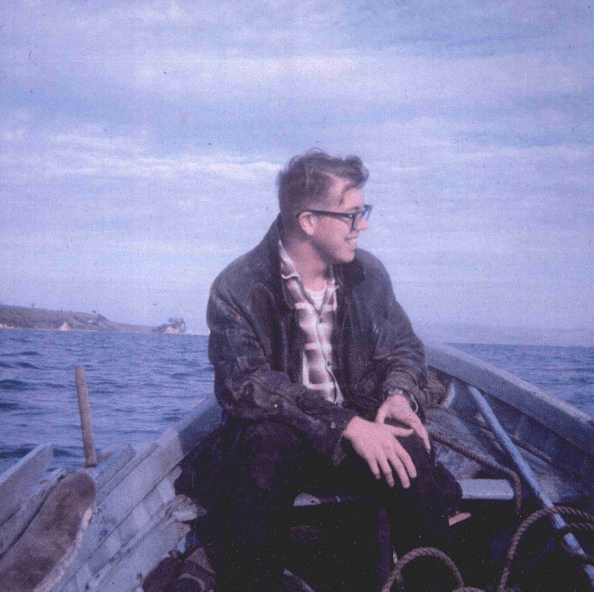
As the band of Tretter siblings grew up, they sought new opportunities. One by one – boys and girls – they enlisted in the military. Jean would soon follow in their footsteps. "Enlisting in the Navy was a logical thing to do because my brothers and sisters had all been in the military." However, because Jean was gay, enlisting also meant lying. During the Vietnam War era, homosexuals were banned from military service, and if discovered, service men and women were jailed, court-marshalled or dishonorably discharged. Jean had no choice but to hide. "I mean I had to. You couldn't tell them you were a homosexual, otherwise you wouldn't be included. They used to threaten us all the time that, 'If we find out you're homosexual, you're going to go to Leavenworth and the Marine guards will beat up on you because you're a homosexual!' So, you had to be careful." And he was. Jean served in the Navy until 1972.
"Enlisting in the navy was a logical thing to do because my brothers and sisters had all been in the military." however, because jean was gay, enlisting also meant lying.
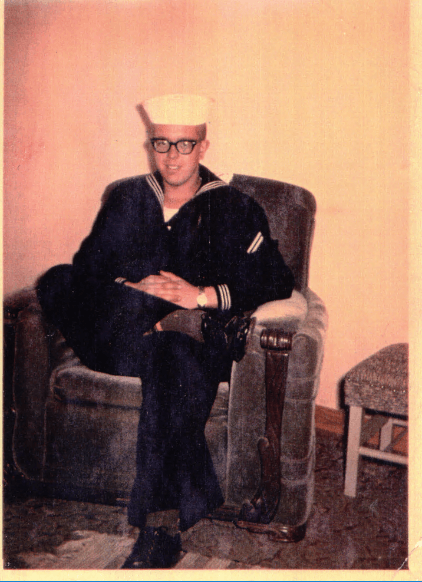
As a Navy linguist, Tretter played a unique role in the service. With top-secret cryptographic clearance, Jean was tasked with intercepting, recording and transcribing Russian space shots. His work would often be forwarded to the President of the United States. The missions were fraught with complicated mathematics and careful translations. During one memorable mission, Jean recounted that he'd been sent to Hawaii because a Russian space capsule was going to pass overhead. The U.S. Navy needed to intercept it, but doubted their ability to get the necessary information from Washington, D.C. to make sure the U.S. would be on the right frequencies. But Jean was stubborn and confident. He convinced his superiors to let him try anyway. He took the meager available data - much of which he'd collected himself – and with the right math he calculated exactly where to point the antenna and at what time. It was a success: The Navy intercepted the Russian space shot.
Jean laughs retelling that story. "They were just flabbergasted. They gave me a special commendation for doing that, which then…they promptly destroyed because it was top-secret classified information. So they took it out of my record and destroyed the letter of commendation. You know, welcome to the military," he chuckles wryly.
"We've been told "no" about everything all of our lives. No, you can't run for public office. You can't become a politician you can't do this, we [LGBTQ+ community] are always proving them wrong."
While he experienced great success, Jean's military service was not without its moments of fear. He couldn't be out of the closet without jeopardizing his career or inviting bodily harm. But having grown up with a strong connection to the church, he sought out the military base chaplain. "I told him I was gay, and [asked] what should I do?" The Lutheran minister said, "Well, you have to tell your commanding officer. You can't be gay and in the military. You just can't do it."
But Jean would have none of it. "I was just mad because he was telling me I couldn't do it, and I'd already done it for two, no, three years when I got to him!" Jean says indignantly. Out of spite and determination, Jean decided not to share his sexual orientation with his commanding officer. Instead, he completed his initial enlistment and then re-enlisted. "We've been told "no" about everything all of our lives. No, you can't run for public office. You can't become a politician you can't do this, we [LGBTQ+ community] are always proving them wrong."
Jean came out after he left the Navy. He attended the University of Minnesota and studied cultural anthropology from 1973 until 1976. He specifically wanted to study gay and lesbian society and culture, but those areas of focus weren't available then, so he left. After all, in the mid-1970s, LGBTQ+ folks could still be arrested in Minneapolis for even carrying "homosexual literature" and activism pamphlets.
"If we were going to save our history at all…we had to start collecting it ourselves."
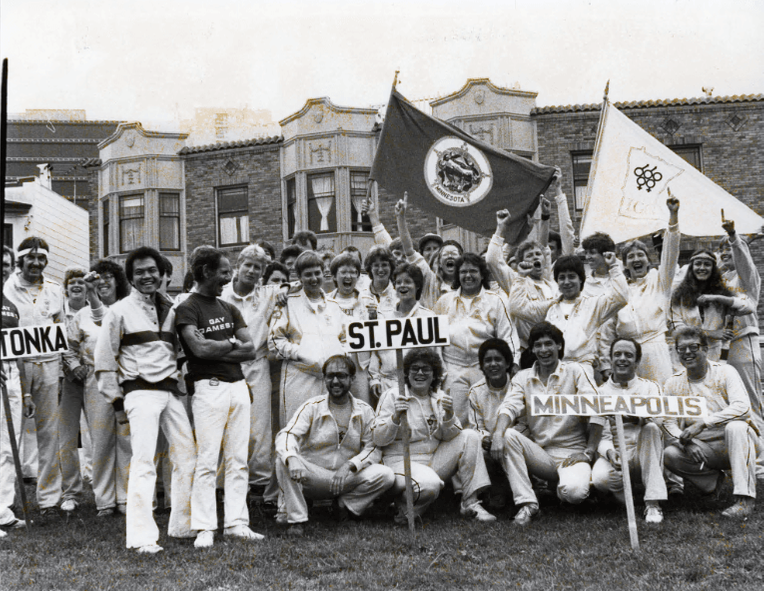
Undeterred, Jean struck out on his own. He leaned into advocacy work, and in 1983, he mounted an exhibit of gay and lesbian history with the Pride Committee. As he worked diligently to collect artifacts, literature, personal items - anything he could get his hands on - he discovered that many of these items were being destroyed. In that moment, he realized, "If we were going to save our history at all…we had to start collecting it ourselves."
In the early years, Jean's collection of books, rescued pamphlets and flyers grew rapidly. His collection became so extensive that his apartment became a maze of piled documents and books, leaving only enough room for his sleeping bag and television.
In 1996, Steven Schochet donated $500,000 to the University of Minnesota to start a gay and lesbian studies program.
Just as Jean began to wonder whether he needed a larger apartment, a remarkable alumni donation changed his life, and unknowingly, the lives of every LGBTQ+ person in Minnesota. In 1996, Steven Schochet, who achieved great success in the computer industry, donated $500,000 to the University of Minnesota to start a gay and lesbian studies program. But the University was faced with a conundrum. In academia, in order to have a program, they needed materials to study. And so they approached Jean about his extensive collection.
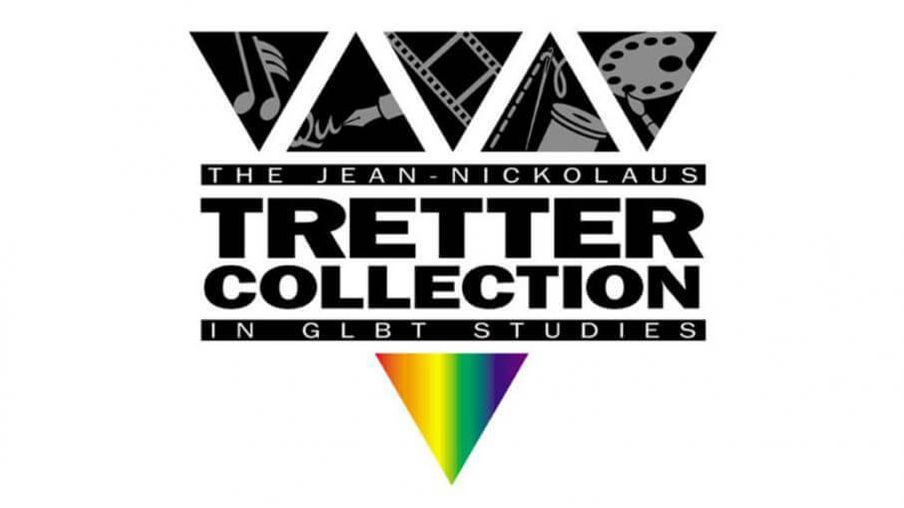
In 2000, Jean made an enormous donation of artifacts and memorabilia, and was ultimately invited on as a staff member to help catalogue and curate what we now know as the Jean-Nickolaus Tretter Collection. "All of a sudden I became the only non-degreed employee of the University of Minnesota, which you know, is a factory for degrees," he beams with pride. Eleven years later, Jean formally retired and passed the torch to other passionate LGBTQ+ archivists, though he continues to serve on the collection's advisory board.
"I don't think any of us expected to get equal rights within our lifetimes. Much less, acceptance in the military and the right to marry and all those sorts of things that we have now…Those were just…dreams."
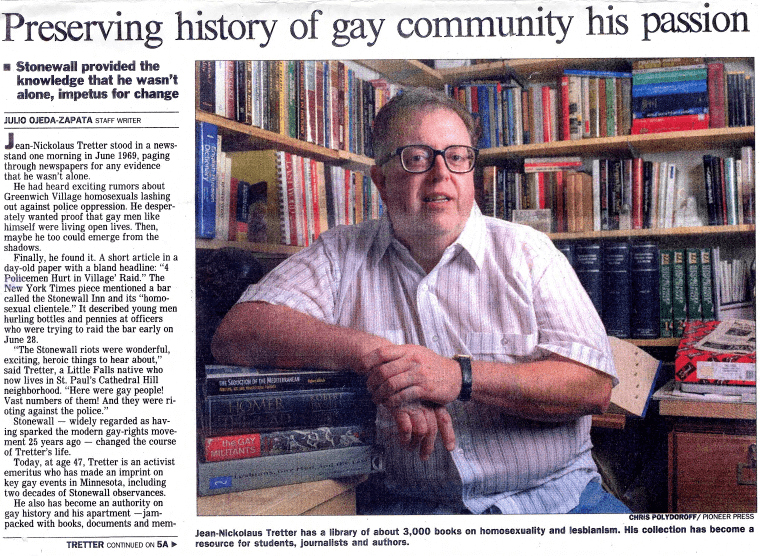
When reflecting on how much has changed since he came out to that military chaplain in the 1960s, Jean is slightly overwhelmed. The collection has grown from boxes in his tiny apartment to more than 3,500 linear feet of materials featuring content in more 58 languages. The collection is regarded as the premiere resource for Upper Midwest queer history. It supports the program Jean could only dream of back in 1976: a college-level minor in Gay, Lesbian, Bisexual, and Transgender Studies. "I don't think any of us expected to get equal rights within our lifetimes, much less acceptance in the military and the right to marry and all those sorts of things that we have now… Those were just…dreams," he says.
Nearly eight years after his retirement, Jean hopes the Collection continues to chronicle and preserve the lives and legacies of contemporary LGBTQ+ folks. He wants to see it grow and encompass the entire LGBTQ+ community, without forgetting the initial gay and lesbian community that paved the way.
Production Team: Emily Taplin, Skip Davis, Diana Fraser, Jim Kron, Terry Gray. Special thanks to the Jean-Nickolaus Tretter Collection staff.
Tretter was originally interviewed for the Twin Cities PBS Original documentary Out North: A MNLGBTQ History (2017).
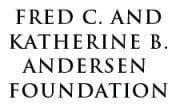
This story is part of the collection The Call to Serve: Stories of Sacrifice, War and the Way Home, which was funded by the Fred C. and Katherine B. Andersen Foundation.
